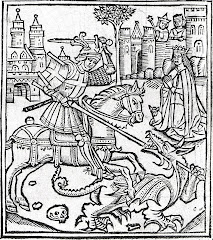This is the first sentence of a short story, "Sint Joris" [Saint George], by a maverick Dutch writer from the last century. He called himself 'Belcampo', Italian for his surname, and he certainly was an eccentric. Being born in 1902, he studied law to become a notary after his father, but he never practised the profession, as the times - the thirties - were difficult. Instead of going on the dole, and feel miserable, he hitch-hiked to Italy, and made it to the north of Sicily, providing for his livelihood and lodging by making pencil portraits of the people he met, wisening up quite a lot on the subject of the human psyche along the road.
After the war [WWII] he studied medicine, and settled as a village GP, and after a decade became a students' physician at Groningen University, until his retirement in 1967.
 He was a lifelong philosopher. Coming home from his Italian adventure, in his mid-thirties, he had his mind already made up about the great picture of the natural world and that of men and their passions, but it took him till after his retirement to put it to paper. As an individualist, he developed his personal philosophy, and called it 'belcampism', for, of course, none of the other philosophies to date fitted his idiosyncratic sense of life and humour. According to his 'The Philosophy of belcampism' [1972], the essence of human life, in extension of the old adage 'to live, and let live', is the attempt 'to live pleasantly, and let live pleasantly'. The rest he considered hot air.
He was a lifelong philosopher. Coming home from his Italian adventure, in his mid-thirties, he had his mind already made up about the great picture of the natural world and that of men and their passions, but it took him till after his retirement to put it to paper. As an individualist, he developed his personal philosophy, and called it 'belcampism', for, of course, none of the other philosophies to date fitted his idiosyncratic sense of life and humour. According to his 'The Philosophy of belcampism' [1972], the essence of human life, in extension of the old adage 'to live, and let live', is the attempt 'to live pleasantly, and let live pleasantly'. The rest he considered hot air.Though, possibly, something is lost in this translation, and his motto should rather be read: 'To thrive, and let thrive'.
Belcampo died in 1990. He left an oeuvre of scores of short stories and tales of a mostly bizarre nature, written in a peculiar, rather antiquated style, but always intriguing and entertaining for the sake of their slightly ironic, seemingly self-evident, but mind-twisting narrative.
Take the sentence on top of this post. At first sight, it seems little short of ludicrous, and if so, it is meant to be. How should the Empire have fathomed, that it had reached its greatest expanse, when it did?
But before you decide, see the follow up: St. George - 1.


Perhaps it is ludicrous to change Devil to Dragon, but no more ludicrous than anything one may think but does not write. Kudos to Belcampo for pursuing his many life paths and leaving for us a testament to living life without boundaries.
ReplyDeleteThank you, Kristen, for your comment. You really touch the gist of Belcampo's life. He was a free spirit.
ReplyDeleteAnd, by the way, it doesn't take more than a little sleight of hand to change a devil into a dragon, and vice versa. They're one of a kind.